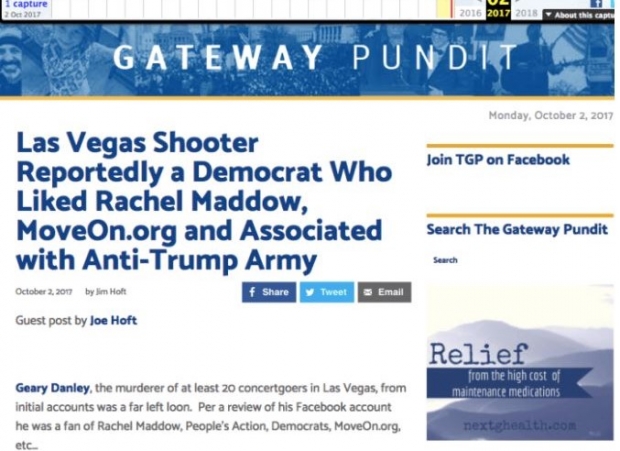Hoaxes, unverified rumours, witch hunts, and falsehoods spread across the internet using Google, Facebook and YouTube.
BuzzFeed's Ryan Broderick found that Google's "top stories" results surfaced 4chan forum posts about a man that right-wing amateur sleuths had incorrectly identified as the Las Vegas shooter.
4chan is a known source not just of racism, but hoaxes and deliberate misinformation. In any list a human might make of sites to exclude from being labelled as "news", 4chan would be near the top.
Google admits that it stuffed up: “ Unfortunately, early this morning we were briefly surfacing an inaccurate 4chan website in our Search results for a small number of queries. Within hours, the 4chan story was algorithmically replaced by relevant results. This should not have appeared for any queries, and we’ll continue to make algorithmic improvements to prevent this from happening in the future.”
On Facebook, a simple search for "Las Vegas" yields a Group called "Las Vegas Shooting /Massacre," which sprung up after the shooting and already has more than 5,000 members.
The group is run by Jonathan Lee Riches, who gained notoriety by filing 3,000 frivolous lawsuits while serving a 10-year prison sentence after being convicted for stealing money by impersonating people whose bank credentials had been phished.
Now he calls himself an "investigative journalist" with Infowars, though there is no indication he's been published on the site, and given that he lists himself as a former male underwear model at Victoria's Secret, a former nuclear scientist at Chernobyl, and a former bodyguard at Buckingham Palace, his work history may not be reliable.
The problems with surfacing this man's group to Facebook users is obvious to any human. But to Facebook's algorithms, it's just a fast-growing group with an active community.
Kevin Roose of The New York Times pointed out that Facebook’s Trending Stories page was surfacing stories about the shooting from Sputnik, a known source of Russian propaganda. Facebook’s statement was, like Google’s, designed to minimise what had happened.
“Our Global Security Operations Center spotted these posts this morning and we have removed them. However, its removal was delayed, allowing them to be screen-captured and circulated online,” a spokesperson responded. “We are working to fix the issue that allowed this to happen in the first place and deeply regret the confusion this caused.”
The Atlantic points out that this was exactly the same as the information disaster which happened after the Boston Bombing, and it appears the main information gatekeepers have not learnt anything.
It seems that Google and Facebook need to realise that algorithms cannot deal with fake news and they need to get humans into the equation to sort out things that machines cannot.
In a wider issue it shows how the industry trend to lean on AI might grind to a halt as the software proves unable to adapt properly to situations.




